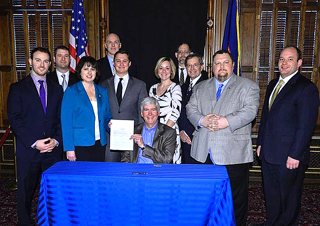The Michigan Department of Agriculture and Rural Development (MDARD), in reviewing their Right to Farm Generally Accepted Agriculture Management Practices (GAAMP), is recommending new language that will give more local control to communities that are exclusively zoned residential. If a community is zoned primarily for residential purposes, then it will be labeled as not acceptable for a livestock facility and there would be no Right to Farm protection for those individuals wishing to have livestock. It would be left solely up to the local unit of government on whether or not they wanted to allow livestock in their community. This is critical to ensure the community is able to make ordinance decisions based on the needs and desires of their residents.
From Michigan Department of Agriculture and Rural Development:
“Siting of New and Expanding Livestock Facilities: Currently the GAAMP defines livestock production facility as any site with 50 animal units or more. 50 animal units is a sizable number – 5000 chickens, 50 steers, etc. The GAAMP was written considering livestock numbers in rural Michigan – so below this number a farmer did not have to voluntarily conform to any siting requirements to receive Right to Farm benefits. If a farmer was above 50 animal units there are a host of standards they need to comply with to be in conformance with the GAAMP and receive the affirmative nuisance defense and freedom from any ordinances which might limit their operation.
In recent years, there has been an increasing interest in having small numbers of livestock in urban residential areas. A number of communities have written exceptions to their ordinances which allows for the keeping of livestock, especially poultry, under certain conditions in urban settings. More and more individuals are using the preemption language of Right to Farm to confine small numbers of livestock in urban residential areas which have not allowed for livestock in their ordinances. The fewer than 50 animal units language in the Livestock Siting GAAMP allows for this to happen because of the small number of animals these individuals are raising- they do not have to conform to the siting GAAMP because it does not apply. We are seeing increasing conflict between municipalities and townships and livestock owners in these urban residential areas.
To address this issue, the commission, department staff, and the Siting GAAMPs committee chaired by MSU have been working on language for the last 18 months which would return control of livestock in urban residential areas to local government. The risk of nuisance issues, conflicts and other environmental factors increase as housing density increases. Because of these risks, bringing livestock into these urban residential areas should not be happening without local jurisdictional oversight.
To be clear, the department supports the expansion of urban agriculture and livestock production across the state. The expansion of agriculture, whether for personal consumption or for local sale/distribution, will provide an opportunity for people to be closer to local food sources. It also creates an opportunity for the urban agriculture movement to be integrated with any local community’s plan for food hubs or farm markets. We would like the local communities to be willing partners in this expansion. It is important to allow the differences in these local communities to be expressed in how they create opportunities for livestock within their jurisdiction. Currently, the department is assisting the City of Detroit in just such an effort.
The keeping of livestock in areas zoned exclusively for residential use has never been a generally accepted agricultural practice. If the proposed Siting GAAMP language is adopted by the Commission at their March meeting, for purposes of the Siting GAAMP, a RTF complaint or proactive request in urban areas will result in a program review of zoning for the location in question. If the zoning is exclusively residential, then the site will be identified as not acceptable for a livestock facility under the Siting GAAMP. A local community may determine to permit possession of animals traditionally used as livestock in this exclusively residential area but compliance with that determination will be left to the local community. If zoning clearly identifies an agricultural use or a mixed agricultural use as its primary zoning designation (e.g., many locations use an agriculture/residential zoning designation), then the site is not zoned exclusively residential and department staff will evaluate whether the site complies with the other requirements of the siting GAAMP. It is important to note in practical terms the changes proposed in the siting GAAMP will have no impact on the many small farm operations in existence in rural areas or suburban areas which are zoned rural residential, R1, R2 or R3 or other zoning designations which allow for some mixed use beyond exclusively residential. “
Nikki Brown is a legislative associate for the League handling economic development and land use issues. She can be reached at nbrown@mml.org or 517-908-0305.


